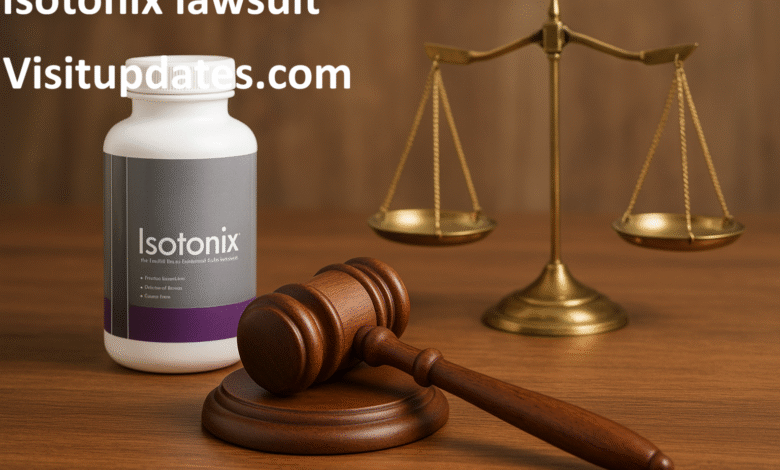Isotonix Lawsuit: Shocking Allegations, Legal Battles, and What Consumers Need to Know

The dietary Isotonix Lawsuit supplement industry has always been a space filled with promises of better health, increased vitality, and improved wellness. Among the brands that have gained significant attention is Isotonix, a line of nutritional supplements marketed by Market America Inc. However, behind the glossy marketing and health claims lies a complex web of legal challenges that have left consumers questioning the legitimacy of these products. The Isotonix lawsuit has brought to light serious allegations ranging from misleading marketing practices to FDA regulatory violations, creating a storm of controversy that every consumer should understand before purchasing these supplements.
Understanding Isotonix and Market America
Isotonix is a brand of dietary supplements that claims to deliver nutrients in an isotonic solution, supposedly allowing for faster and more efficient absorption by the body. Market America Inc., the parent company behind Isotonix, operates through a multi-level marketing business model where independent distributors sell products and recruit others to join the sales network. This structure has been a point of contention, with critics arguing that it resembles a pyramid scheme more than a legitimate business operation. The company has Isotonix Lawsuit built a substantial following over the years, with thousands of distributors promoting products ranging from multivitamins to specialty supplements for joint health, digestive support, and immune function.
The Core Allegations Behind the Isotonix Lawsuit
The Isotonix lawsuit encompasses multiple serious allegations, including misleading marketing strategies, unsubstantiated product claims, and violations of FDA regulations. At the heart of these legal challenges is the question of whether Market America has been truthful in how it presents the benefits and effectiveness of its Isotonix products. The primary concerns revolve around how the company presented its supplement’s absorption rates and the scientific evidence supporting these claims. Consumers who purchased these products based on the company’s marketing materials have raised questions about whether the promised Isotonix Lawsuit benefits were backed by legitimate scientific research or simply clever advertising designed to boost sales.
Beyond product claims, the lawsuit also encompasses claims related to the MLM structure of Market America, with plaintiffs accusing the company of operating a deceptive pyramid scheme. This allegation strikes at the very foundation of how the company operates, suggesting that the business model prioritizes recruitment Isotonix Lawsuit over actual product sales and that distributors are misled about their potential earnings.
FDA Warning Letters and Regulatory Violations
One of the most damaging blows to Market America’s reputation came from federal regulators. The FDA issued a warning to Market America in 2020 for improper supplement labeling that failed to meet federal guidelines, failure to report adverse reactions linked to Isotonix products, and unsubstantiated health claims that violated FTC regulations. This wasn’t just a minor slap on the wrist; it represented serious concerns from the Isotonix Lawsuit nation’s top health regulatory agency about how the company was conducting its business and marketing its products to consumers.
The FDA sent a warning letter to Market America Inc for failure to submit serious adverse event reports about two of its products, as required by federal regulation, noting that the company received two reports following serious adverse events but did not submit the proper forms. This failure to report adverse health events is particularly troubling because it suggests a lack of transparency and potentially puts consumers at risk by Isotonix Lawsuit hiding important safety information from regulators who are tasked with protecting public health.
Deceptive Income Claims and MLM Concerns
The business model itself has come under intense scrutiny. In 2017, Truth in Advertising investigated Market America for making deceptive income claims, with the organization finding that the company had made false promises about potential earnings. These allegations are particularly significant because they affect not just consumers purchasing products, but also individuals who invested time and money into becoming distributors, believing they could earn substantial income through the business opportunity.
The multi-level marketing structure has raised red flags for consumer advocates who argue that these systems often prioritize recruitment over product sales, leaving most participants with little to no profit while enriching those at the top of the pyramid. The question of whether Market America operates as a legitimate direct sales Isotonix Lawsuit company or an illegal pyramid scheme has been central to several legal challenges facing the organization.
Timeline of Legal Challenges
Between 2017 and 2020, Isotonix faced lawsuits on several fronts, including accusations of being a pyramid scheme, trademark infringement claims, and an FDA warning for breach of supplement-labeling laws. This concentrated period of legal troubles reveals a pattern of regulatory and legal issues that go far beyond isolated incidents. Each challenge has added another layer of concern for consumers who trusted the brand and Isotonix Lawsuit distributors who invested in the business opportunity.
The timeline shows that these weren’t one-time mistakes but rather ongoing issues that persisted across multiple years, suggesting systemic problems within the company’s operations, marketing practices, and regulatory Isotonix Lawsuit compliance efforts.
Impact on Consumer Trust and Brand Reputation

The accumulation of Isotonix Lawsuit and regulatory warnings has significantly damaged the Isotonix brand’s credibility. Consumers who once believed in the superior absorption technology and health benefits touted by the company now find themselves questioning whether they were misled. The dietary supplement industry already operates in a space with limited FDA oversight compared to pharmaceutical drugs, making Isotonix Lawsuit trust and transparency even more critical for companies selling these products.
Social media and online forums have become platforms where former customers and distributors share their experiences, many expressing frustration over products that didn’t deliver promised results or business opportunities that failed to generate the income suggested in marketing materials. This grassroots conversation has amplified the impact of the official legal challenges, creating a broader narrative of distrust around the brand.
What the Science Says About Isotonic Delivery
A key component of Isotonix’s marketing has been the claim that isotonic delivery systems allow for superior nutrient absorption. While isotonic solutions—those with the same osmotic pressure as body fluids—are indeed Isotonix Lawsuit used in medical settings, the scientific evidence supporting dramatic improvements in nutrient absorption for dietary supplements delivered this way remains limited and debated within the nutritional science community.
Critics argue that the digestive system is highly efficient at absorbing nutrients from various forms, and that the isotonic delivery system may not provide the revolutionary benefits suggested by marketing materials. The lack of robust, independent clinical trials specifically examining Isotonix products has been a point of contention in Isotonix Lawsuit legal proceedings and among health professionals evaluating the brand’s claims.
Consumer Rights and Legal Recourse
For consumers who feel they’ve been harmed or misled by Isotonix products, understanding legal options is important. Individuals who experienced adverse health effects after using these supplements may have grounds for product liability claims, particularly in light of the FDA’s findings about unreported adverse events. Those who purchased products based on what they believe were false or misleading health claims may have consumer Isotonix Lawsuit protection remedies available.
Documentation is critical for anyone considering legal action. Preserving purchase receipts, medical records showing any adverse reactions, marketing materials that influenced the purchase decision, and any communications with distributors or the company can all be valuable evidence. Consulting with a consumer protection attorney who specializes in dietary supplement cases or MLM-related litigation can help individuals understand their specific situation and available options.
How Market America Has Responded
Market America has consistently maintained its position as a legitimate wellness company offering quality products through a direct sales model. The company has disputed allegations of operating a pyramid scheme, arguing that it sells genuine products with real demand and that distributors can earn income through retail sales, not just recruitment. In response to FDA warnings, the company has indicated it has taken steps to address labeling and reporting compliance issues.
However, critics point out that responding to regulatory warnings only after being cited doesn’t demonstrate a proactive commitment to compliance and consumer safety. The company’s defenses haven’t fully satisfied skeptics who continue to question the fundamental structure of its business model and the validity of its product claims.
Red Flags Consumers Should Watch For
Anyone considering purchasing Isotonix products or joining Market America as a distributor should be aware of several warning signs. Claims that seem too good to be true, particularly those suggesting products can cure or prevent serious diseases, should be met with skepticism. The FDA does not approve dietary supplements before they go to market, and any suggestion that a supplement has been “FDA approved” for treating medical conditions is a major red flag.
For potential distributors, unrealistic income projections, pressure to purchase large amounts of inventory, and business models that seem to prioritize recruitment over product sales are all indicators of potentially problematic MLM structures. Legitimate direct sales opportunities provide clear information about average earnings, typical success rates, and don’t require substantial upfront inventory investments.
The Broader Context of Supplement Industry Regulation
The Isotonix situation highlights broader issues within the dietary supplement industry. Unlike pharmaceutical drugs, which must undergo rigorous testing and FDA approval before reaching consumers, dietary supplements operate under the Dietary Supplement Health and Education Act of 1994, which places most regulatory responsibility on manufacturers and limits FDA oversight primarily to taking action after products reach the market.
This regulatory gap means consumers must be more vigilant and informed when choosing supplements. The burden of verifying claims, researching ingredients, and assessing quality largely falls on individual consumers rather than government regulators, making cases like the Isotonix lawsuit particularly important as they bring transparency to industry practices.
What Current and Prospective Consumers Should Do
If you’re currently using Isotonix products, the most important step is to consult with a qualified healthcare professional about your supplement regimen. Don’t make abrupt changes to your health routine without medical guidance, but do ask critical questions about whether these specific products are appropriate for your health needs and whether there’s scientific evidence supporting their use for your particular situation.
For those considering purchasing Isotonix or similar products, take time to research beyond the company’s marketing materials. Look for independent, peer-reviewed scientific studies on the specific products or formulations you’re considering. Read the actual FDA warning letters and legal complaints to understand the specific allegations rather than relying solely on summaries. Check with consumer protection organizations and the Better Business Bureau for complaint histories and ratings.
The Future of the Isotonix Lawsuit and Market America
The Isotonix lawsuit is ongoing, and the outcome could reshape both the company and the supplement industry. Legal proceedings of this magnitude typically take years to fully resolve, meaning consumers and distributors may face continued uncertainty about the brand’s future. Potential outcomes could range from settlement agreements requiring changes to marketing and business practices, to more severe judgments that could fundamentally alter how the company operates or even threaten its continued existence.
The broader supplement industry is watching these cases closely, as significant judgments against Market America could set precedents affecting how other companies market their products and structure their MLM-based sales models. Regulatory agencies may also use these cases as justification for tighter oversight of the dietary supplement sector.
Making Informed Decisions About Your Health
At the end of the day, the Isotonix lawsuit serves as a powerful reminder that consumers must be their own advocates when it comes to health and wellness products. The allure of easy solutions to complex health challenges is understandable, but critical thinking and due diligence remain essential. No supplement—regardless of how it’s delivered or marketed—can replace a balanced diet, regular exercise, adequate sleep, and proper medical care.
Before investing money in any dietary supplement program, especially one tied to an MLM structure, take the time to verify claims independently, consult healthcare professionals, understand the actual scientific evidence (or lack thereof), and be realistic about both the potential benefits and risks. The ongoing legal battles surrounding Isotonix demonstrate that even well-established brands with extensive marketing reach can face serious questions about their practices and claims.
Your health and financial wellbeing are too important to leave to marketing promises alone. Stay informed, ask questions, demand evidence, and remember that if something sounds too good to be true, it probably deserves a closer look before you commit your trust—and your money.



